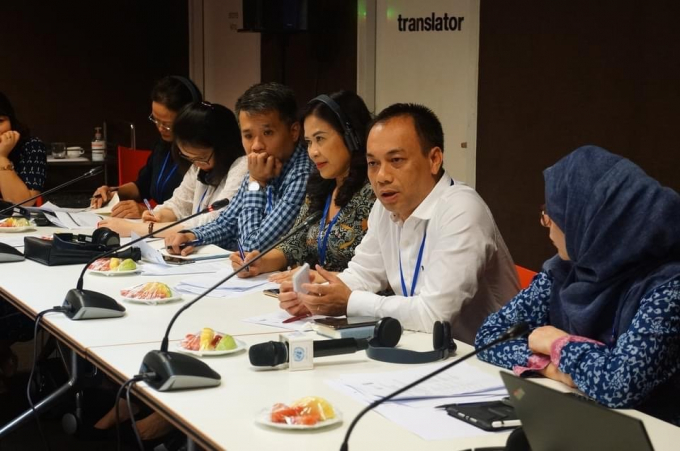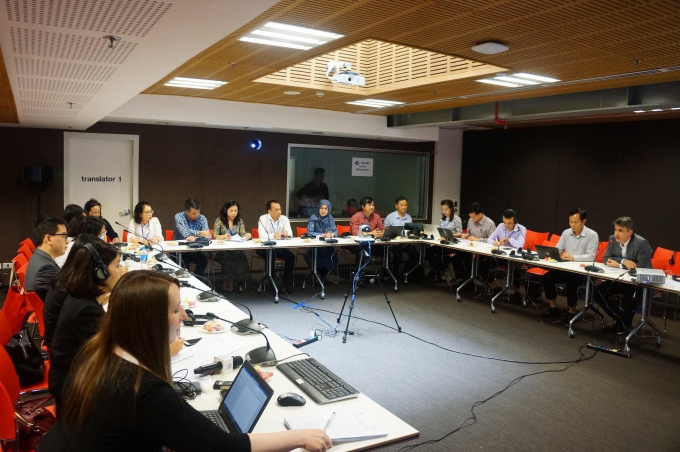November 26, 2025 | 12:25 GMT +7
November 26, 2025 | 12:25 GMT +7
Hotline: 0913.378.918
November 26, 2025 | 12:25 GMT +7
Hotline: 0913.378.918

Delegates at the workshop.
The workshop aimed to gain a comprehensive understanding of the Vietnamese context and identify the possible interventions and technical support needed for the country, which has been selected as one of the first ten countries to participate in a new UNDP global initiative under its new Insurance and Risk Finance Facility (IRFF) to make inclusive insurance and risk financing central to development.
This new initiative has been designed jointly with the Insurance Development Forum (IDF) and is financially supported by the Government of Germany. UNDP will also work with the InsuResilience Solutions Fund (ISF) and global insurance industry partners to develop new disaster risk financing and insurance products to reduce the negative impacts of disasters.
Risk financing and inclusive insurance are important to protect lives, livelihoods, infrastructure and homes from the impact of disasters, but also to provide coverage for sustainably protecting healthcare and education services, as well as employment, and agricultural supply chains. However, little attention has been paid to risk financing at the global and country levels. There is, for example, a huge protection gap in developing countries (including Viet Nam), where less than five percent of losses due to disasters are covered by insurance, as compared to over 50 percent in high-income countries. These protection gaps are also prevalent beyond disaster losses, resulting in increased expenses in healthcare and losses in property, livelihoods, and agriculture.
Research into multi-aspect disaster risk financing suggests that different insurance schemes could potentially reduce losses from disasters in the poorest countries by as much as 25 percent through a range of risk financing tools, including parametric insurance, insurance-backed social protection, and indemnity-based products.
As a first step in the unfolding of this new initiative in Viet Nam, UNDP is carrying out a diagnostic study. The study, which will cover significant areas across the inter-related disciplines of insurance and risk finance, will help to articulate the evolution of the insurance supply side; develop a picture of the demand side; ascertain the gaps and opportunities in creating an enabling environment through government policy and regulatory environment; recommend means of building regulatory capacities; assess the financial standing of the insurance companies; and suggest suitable approaches towards developing new market opportunities. It will also help to generate an information profile for Viet Nam and the knowledge relevant for inclusive insurance, such as providing the demographic, socio-economic, and sectoral context for developing insurance and risk transfer solutions.

Delegates at the workshop.
According to Ms. Sitara Syed, UNDP Deputy Resident Representative in Viet Nam, who spoke at the workshop, “the concept of disaster risk financing is still a relatively new concept in Viet Nam, but the opportunities are considerable. In addition to putting national and local governments in a stronger position to plan for disasters ahead of time, a more enabling environment could also support quicker and more efficient response and recovery work for when disasters inevitably occur.”
“This initiative will require a significant level of support and collaboration with government ministries, such as Ministry of Finance, as well as provincial and local authorities, development partners, insurance industry partners and the private sector,” highlighted Ms. Syed.

(VAN) After the institutional merger, Da Nang possesses significant forest-carbon reserves and is proactively engaging in the carbon market, creating a new revenue stream.

(VAN) An Giang strengthens communication against IUU fishing, increases inspections and sanctions, and is determined to remove the EC’s “yellow card” while developing a sustainable fisheries sector.

(VAN) As green transition becomes a global trajectory, Viet Nam’s biggest challenge is not only technology and models, but how to ensure that capital flows reach the right beneficiaries.

(VAN) The Ministry of Agriculture and Environment must spearhead the construction of green governance, spanning decision-making processes and investment standards to policy evaluation mechanisms.

(VAN) The Agriculture and Environment sector of Khanh Hoa has achieved numerous milestones over the past 80 years, contributing significantly to the goal of establishing the province as a centrally governed city by 2030.

(VAN) Viet Nam is entering the pivotal period of 2025-2030, moving toward the formulation of the Remote Sensing Law, which will establish a legal foundation for the development of national digital data.

(VAN) The agricultural sector is finalizing the strategic framework for emission reduction, setting the goal of sharply cutting methane and 403.7 million tons of CO2 equivalent and moving toward Net Zero by 2050.